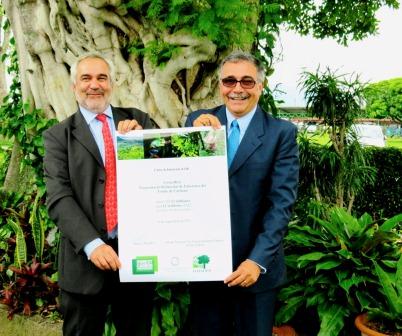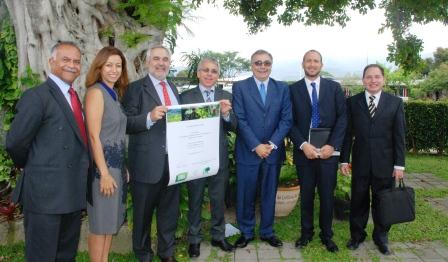The Forest Carbon Partnership Facility (FCPF) 2025 Annual Report highlights a year of strong progress in results-based climate finance and in helping countries prepare for the next phase of high-integrity carbon markets.
FCPF 2025 Annual Report
Costa Rica and the FCPF sign Letter of Intent to negotiate purchase of emission reductions of up to $63 million to conserve and regenerate forests

The Government of Costa Rica and the World Bank acting on behalf of the Forest Carbon Partnership Facility (FCPF) signed a Letter of Intent (LOI) to negotiate an Emission Reductions Payment Agreement (ERPA) worth up to US$63 million on September 10, 2013. This would make Costa Rica the first country in the FCPF to access large-scale performance-based payments for conserving its forests, regenerating degraded lands, and scaling up agro-forestry systems for sustainable landscapes and livelihoods.
The signing ceremony of the Letter of Intent (LOI) was presided by Laura Chinchilla, President of Costa Rica, and Fabrizio Zarcone, World Bank Representative for Costa Rica. The LOI was signed by Rene Castro, Minister of Environment and Energy, and Laurent Msellati, World Bank Sector Manager in the Sustainable Development Department for Latin America and the Caribbean.
The LOI commits the FCPF Carbon Fund to negotiate the purchase of carbon emission reductions (commonly known as carbon credits) up to a value of US$63 million. The country’s proposal to the FCPF Carbon Fund would help meet pending demand for additional landowners to participate in the Payments for Environmental Services (PES) program that will protect and regenerate forests on about 340,000 hectares of privately owned land and also in Indigenous People’s territories.
The proposed program to reduce emissions from deforestation and forest degradation (REDD+) is the first implemented at a quasi-national level and one of the largest to date. A novel aspect of the program is that 10 percent of the target area will be in Indigenous Peoples’ territories.
Costa Rica has long been a global pioneer in preserving tropical forests and exploring innovative ways to change its development path and pursue sustainable green growth. Additionally, the country’s ambitious transition to carbon-neutrality by 2021 depends on better management of forested and agricultural land, where approximately 80 percent of its projected carbon emission reductions are expected to come from.
View Press Release (English, Spanish)

